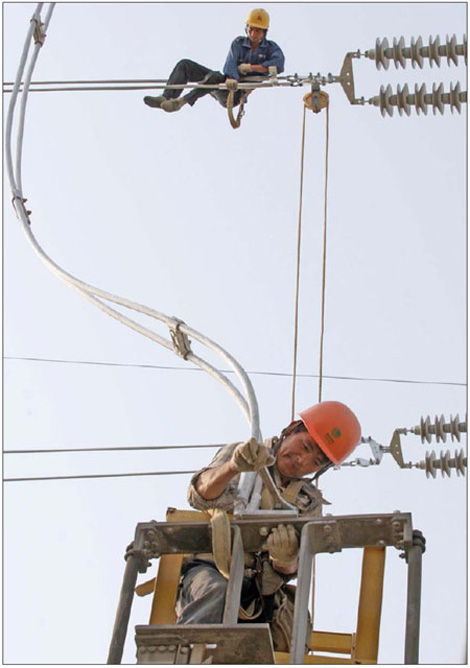Energy
Power plays
Updated: 2011-06-10 11:26
By Meng Jing, Zhang Chunyan and Hu Haiyan (China Daily European Weekly)
 |
|
Workers check power wires in Huaibei, East China's Anhui province, last month. Provided to China Daily |
"The high price of coal and the low price of power have stopped many coal-fired plants from operating. The more power they produce, the greater loss they endure," Lin says.
How effective the government's move can be is still unclear, but analysts have already pointed to the side effects brought by the rise of electricity prices.
The average 16.7 yuan per megawatt-hour boost for non-residential users will affect the consumer price index "indirectly" by 0.05 percentage point, China Central Television cited Liu Shujie, head of economic research at the National Development and Reform Commission, as saying on May 30. The commission is China's top economic planning agency.
Inflation was 5.3 percent in April, above the government's 2011 target of 4 percent.
The government may increase industrial power rates further and raise residential tariffs in the second half of 2011, says Shen Minggao, Citigroup's China research head.
A 10 percent consumer power price rise would push inflation up by 0.25 of a percentage point, he says.
The domestic inflation caused by a power shortage will add to other cost pressures in China. "And it could feed into export prices for Chinese goods, which will in turn impact inflation in Europe," says Duncan Freeman, senior research fellow with Brussels Institute of Contemporary China Studies at Vrije Universiteit Brussel.
 |
In its latest survey of 232 exporters in February, 74 percent respondents said they increased export prices in 2010. The report points out that export prices are likely to increase in the months ahead, especially if the cost of major materials and components continues to rise.
Societe Generale, a European financial services company, said in May that "the dynamic of China export inflation seems as inevitable as gravity itself" in its report The China Domino has Fallen!
"Chinese demand for oil and steel has pushed prices up in those markets. Now it is affecting commodities such as cotton and food products. That's being passed on to developed markets," the report says.
The surging demand is not only about oil and steel. China's appetite for energy resources, which aims to cure the ongoing power shortage, will likely push up prices of energy resources abroad.
China has shocked Asian energy markets by suspending diesel exports to ensure domestic supplies are adequate as demand for the fuel rises.
The decision in mid-May means a significant tightening of diesel supplies across Asia as China is a big exporter to Singapore and Vietnam.
The move was followed by the National Development and Reform Commission's announcement on June 1 that it encourages higher coal imports to ensure domestic supplies in the summer, peak power-consuming season.
Around 75 percent of power is generated by coal-fired plants in China. The country became a net importer of coal in 2007 and emerged as the world's second-largest coal importer after Japan in 2010, despite the fact that it is a major coal producer in the world.
The price of thermal coal at Qinhuangdao Port, a Chinese benchmark, reached 810 yuan a ton in May, 30 yuan higher than the previous month, according to China National Coal Association.
According to osc.org.cn, a major coal trading information and service website, thermal coal prices in the main harbors around the Bohai Sea have been increasing for 10 weeks since March.
International coal prices are also rising, which is about 100 yuan more for each ton than domestic prices, according to the National Development and Reform Commission.
Kim Van der Borght, professor of International Economic Law at University of Brussels, says that the electricity shortage in China will be regarded as a high-risk situation whereby China will be forced to secure energy resources abroad.
"This will increase the competition for energy sources in international markets," Van der Borght says. "The experience that the EU has with competing with China for scarce resources in Africa has left the EU worried that it can lead to major challenges for the EU in sourcing its energy resources."
However, some argue that the risk of exporting inflation to European countries can be reversed if the EU starts to source from other countries, where production costs are lower.
Gilbert Van Kerckhove, chair of Public Procurement Working Group with European Union Chamber of Commerce in China, says the power shortage in China won't hurt Europe too much.
"For Chinese companies making and exporting consumer goods, which are competitive in price, to European countries, they may raise their products prices but will end up losing market share," he says.
A January survey from Global Sources shows that more than 50 percent of buyers intend to increase sourcing from India and Vietnam because Chinese exporters are becoming less competitive with other low-cost countries.
Specials

Birthday a new 'starting point'
China's national English language newspaper aims for a top-notch international all-media group.

Room at the inn
The Chinese hotel industry experiences a building boom, prompting fears of oversupply.

Pearls of wisdom
Chinese pearl farmers dominate the world market but now want to work smarter, not harder